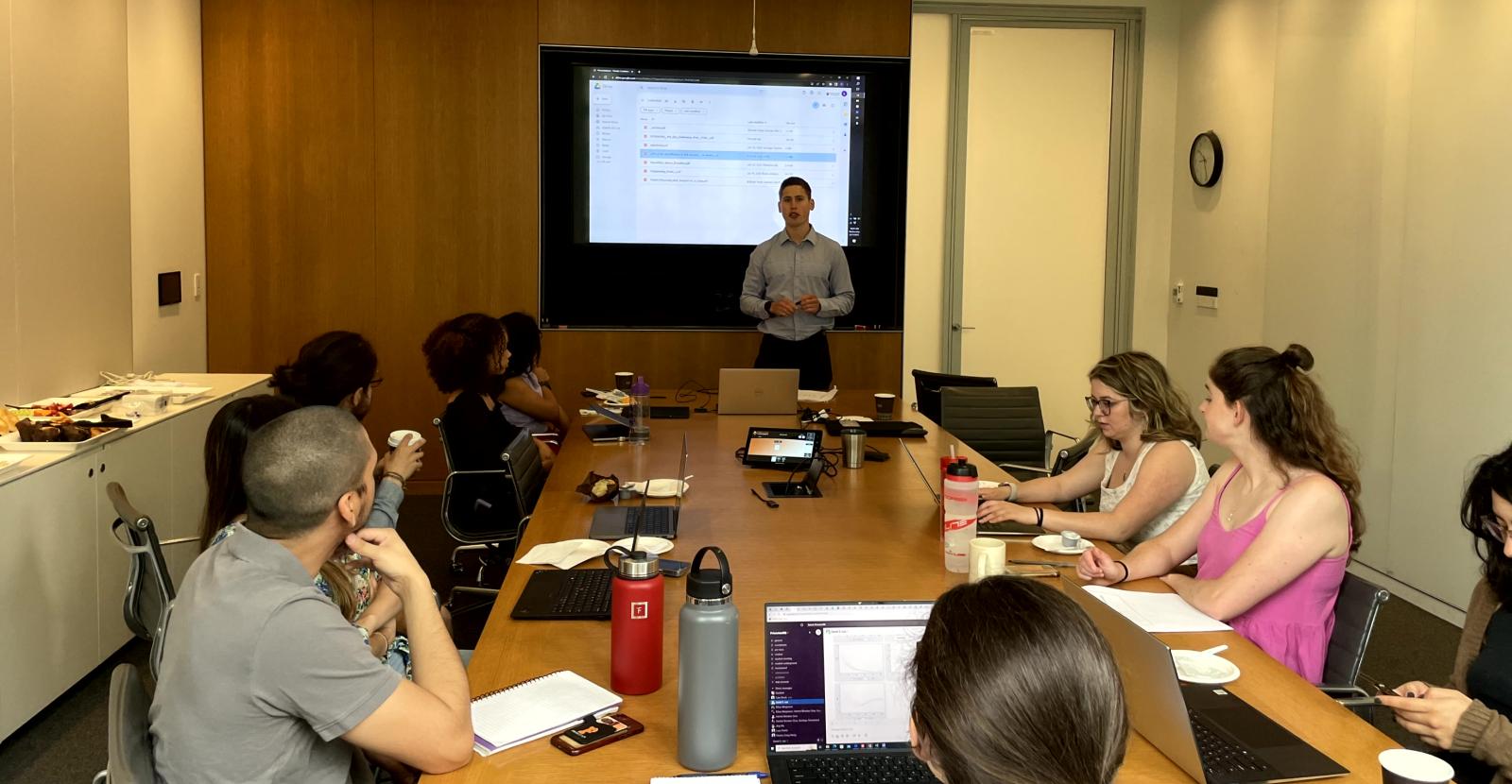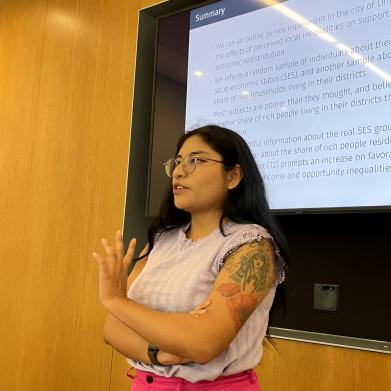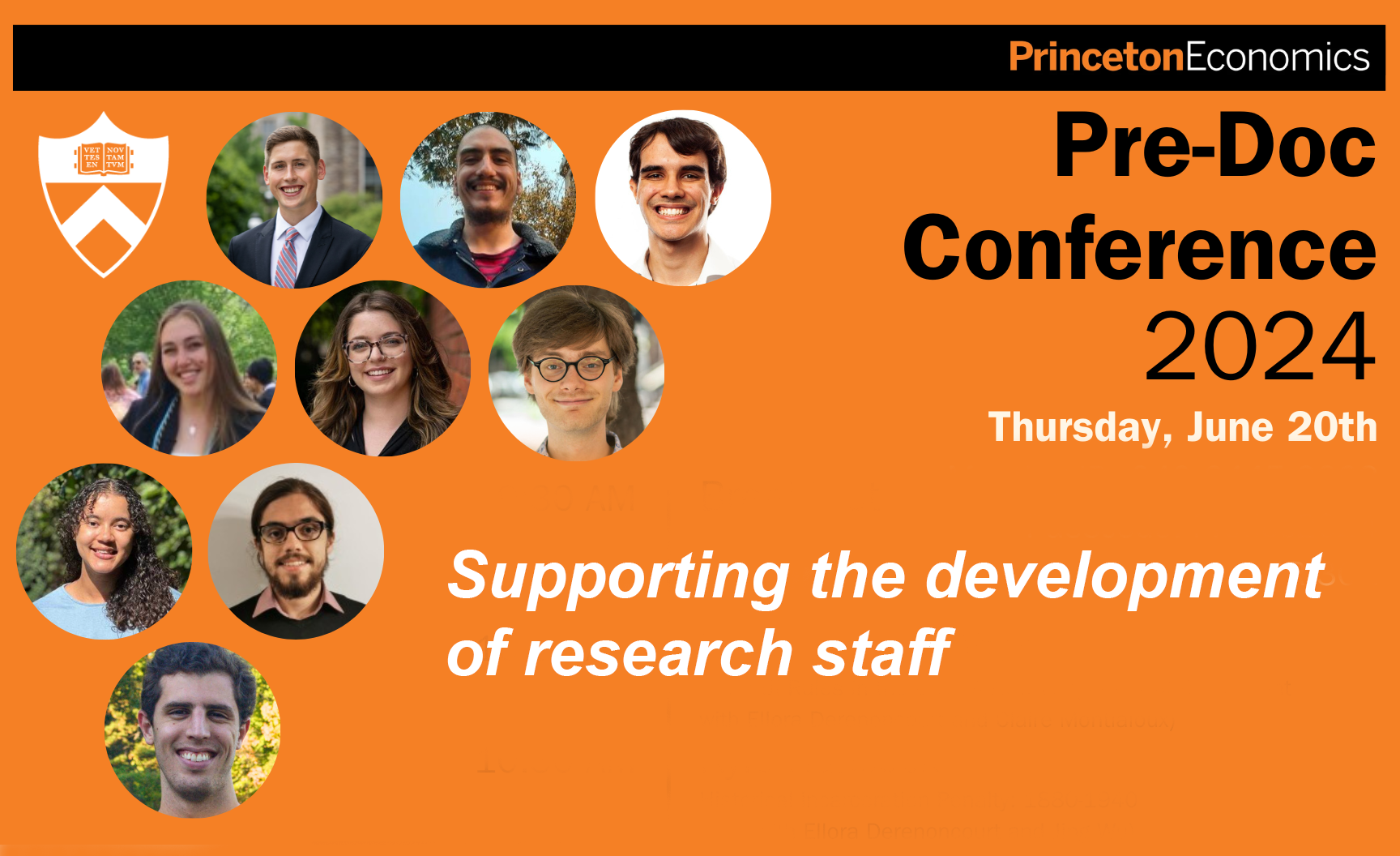| Time | Event | Details |
|---|---|---|
| 09:30am - 10:00am | BREAKFAST |
|
| 10:00am - 10:30pm | State Unemployment Insurance Rules in the U.S.: A New Long-Run Database
History
|
Author: Monica Essig Aberg Coauthors: Ellora Derenoncourt and Claire Montialoux |
| 10:30am - 11:00am | Historical Incarceration Penalty: 1880-1940
History
|
Author: Kyle Hancock Coauthor: Ellora Derenoncourt and Jing Wu |
| 11:15am - 11:45am | Access to Opportunity in the Sciences: Evidence from the Nobel Laureates
Political Economy
|
Author: Catriona Farquharson Coauthor: Paul Novosad, Sam Asher, and Eni Iljazi |
| 11:45am - 12:15pm | Presidential Impeachment and Democratic Frictions
Political Economy
|
Authors: Bruno Jimenez and Pedro Cabra-Acela |
| 12:15pm - 01:15pm | LUNCH |
|
| 01:15pm - 01:45pm | Migration Responses to Abortion Policy
Health
|
Author: Ethan Bergmann |
| 01:45pm - 02:00pm | Advancing Radiological Accident Modeling for Environmental Justice
Health
|
Author: Raven Witherspoon |
| 02:15pm - 02:45pm | Effect of Union Funding on Labor Market Outcomes: Evidence from Brazil
Labor
|
Author: Sergio Andre Cristovao Nascimento |
| 02:45pm - 03:05pm | Job Prospects, Informality and Long-Term Labor Market Outcomes for Youth: Evidence from Chile
Labor
|
Author: Bernardo Esteves Wanderley |

10:00am
State Unemployment Insurance Rules in the U.S.: A New Long-Run Database
Monica Essig Aberg
Princeton university
Abstract
Heterogeneity in state unemployment insurance (UI) policy in the U.S. drives large racial gaps in coverage among workers with equal work histories. We build a new database of harmonized state UI rules dating back to the inception of the federal-state UI system to evaluate how state laws evolved over time and their impact on inequality. We document an increase in the complexity of state eligibility rules from 1941 to the present day. We combine our new data with Census microdata to document gaps in eligibility across demographic groups due to state rule differences, income and work eligibility requirements, and industry exemptions. We show that gaps in eligibility for Black women in the mid 20th century were driven primarily by the exclusion of specific industries, such as domestic services, from UI coverage.
Coauthors: Ellora Derenoncourt and Claire Montialoux
Speaker Bio:
Monica Essig Aberg is a Senior Research Specialist in the Industrial Relations Section who is interested in using the tools of labor economics and economic geography to understand and combat structural patterns of inequality. She will attend the University of California, Berkeley in the fall to pursue an Economics PhD.
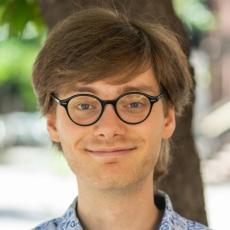
10:30am
Historical Incarceration Penalty: 1880-1940
Kyle Hancock
Princeton University
Abstract
Using census linking and incarceration identification methods, we leverage the universe of the identifiable incarcerated population in the full-count US census between 1880 to 1940 to explore the labor market effects of incarceration for men aged 16-26. We highlight that the "incarceration penalty," the difference in outcomes including employment and income scores between the formerly incarcerated and the non-formerly-incarcerated, deepened substantially during the 20th century, as the incarceration rate doubled, approaching 10-15% in 1940. We present results using a variety of outcomes, subgroups, and specifications, as well as discuss mechanisms for the penalty and its dynamics.
Coauthors: Ellora Derenoncourt and Jing Wu
Speaker Bio:
Kyle Hancock is a Senior Research Specialist in the Industrial Relations Section who seeks to use applied microeconomic research to investigate racial and gender disparities and advance the understanding of effective policies for their mitigation.

11:15am
Access to Opportunity in the Sciences: Evidence from the Nobel Laureates
Catriona Farquharson
Princeton University
Abstract
We measure access to opportunity by studying the parental backgrounds of Nobel laureates in the sciences. This is a useful setting for two reasons. First, scientific innovation has huge positive externalities for society; the social costs of failing to nurture scientific talent are huge. Second, we can generate a long time series spanning birth cohorts from 1835–1975, allowing us to track changes in equality of opportunity over time. We categorize childhood socioeconomic status based on the occupations of winners’ fathers. We present five results. First, winners come from elite families; the average winner has a father at the 87th percentile of the occupational income distribution and the 90th percentile of the occupational education distribution. If talent is evenly distributed, then this suggests that over three quarters of the most talented scientists are not achieving their potential. When we additionally take nationality into account, we find that winners on average come from families in the 94th global income percentile, an even worse misallocation. Second, equality of opportunity in the sciences is improving over time, albeit slowly. Over the 123 years since the first Nobel Prize, the average winner’s parent rank has fallen by 8 percentage points for income and 7 percentage points for education. Third, women face greater barriers to success in the sciences. Female winners are only 4% of the sample, but come from families 4 percentage points higher in the income and education distributions. Fourth, U.S.-born winners have parental ranks that are 5 percentage points lower than winners from the rest of the world, suggesting greater access to opportunity in the sciences in the United States. Fifth, U.S. cities with higher equality of opportunity have historically been more likely to produce Nobel Prize winners from outside of elite social classes, as well as more likely to produce prize winners at all.
Coauthors: Paul Novosad, Sam Asher, and Eni Iljazi
Speaker Bio:
Catriona (Catia) Farquharson is a Senior Research Specialist in Public Finance from Kingston, Canada who is interested in urban economics, education, and economic inequality. She earned a Bachelor's degree in Economics from Dartmouth College in 2023 and plans to begin a PhD next year.
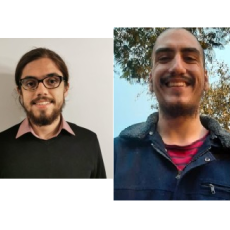
11:45am (Virtual)
Presidential Impeachment and Democratic Frictions
Bruno Jimenez and Pedro Cabra-Acela
Princeton University
Abstract
We investigate the effects of the impeachment and arrest of former President Pedro Castillo on public opinion in Peru. Using a difference-in-differences (Diff-in-Diff) approach, we compare trends in political attitudes between districts that supported Castillo in the elections and those that did not. Our findings show a significant decline in central government approval by 15 percentage points (45%) and an increase in the perception of racial discrimination by 0.8 percentage points (53%). Additionally, trust in the police and armed forces decreases by 1.9 and 4.2 percentage points, respectively. These effects are not observed during smooth presidential transitions, indicating that Castillo's impeachment had a unique impact not seen in standard presidential transitions.
Speaker Bio:
Pedro and Bruno are Senior Research Specialists at Princeton's Research Program in Development Economics. Their interests span development, labor economics, political economy, public finance, and econometrics. This fall, Pedro will attend the University of California, Los Angeles to pursue a PhD in Economics, while Bruno will pursue the same degree at New York University.
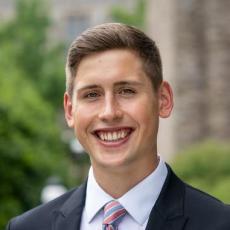
1:15pm
Migration Responses to Abortion Policy
Ethan Bergmann
Princeton University
Abstract
This study examines whether obstetricians and gynecologists (OBGYNs) respond to restrictive abortion policies by migrating out of states with such policies. The research uses a panel of physicians to analyze if those in restrictive states show a higher propensity for migration compared to those in less restrictive states.
Speaker Bio:
Ethan Bergmann is a Senior Research Specialist in the Industrial Relations Section who is interested in health and public economics. He is an incoming PhD Student in Economics and Public Policy at the University of Michigan and a National Science Foundation Graduate Research Fellow.
1:45pm
Advancing Radiological Accident Modeling for Environmental Justice
Raven Witherspoon
Princeton University
Abstract
The large-scale production of nuclear weapons during the Cold War has had a significant long-term impact on the environment. In the United States, several sites associated with fissile material production as well as nuclear weapon component manufacturing, such as pit production, have been turned into EPA “superfund” sites, and are still being cleaned-up at a cost of tens of billions of dollars. Beyond routine discharge of radionuclides to the environment, some sites also experienced significant radiological accidents often impacting nearby indigenous, minority, and low-income communities. This paper discusses how advances in atmospheric transport modeling, weather reanalysis, and geographic information service techniques offer new opportunities to revisit the consequences of past accidents through an environmental justice lens. It will provide examples for the reconstruction of radiological accidents such as the 1957 plutonium fire at the Colorado Rocky Flats plant. These tools could also be used to assess the potential impact of radiological releases today leveraging even better spatial and temporal resolution weather data and census information.
Speaker Bio:
Raven Witherspoon is a Senior Research Specialist in the Program on Science and Global Security. She conducts technical research at the intersection of nuclear energy and nuclear weapons policy.
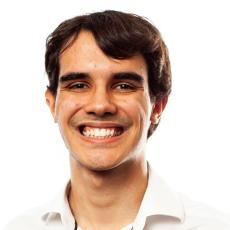
2:15pm
Effect of Union Funding on Labor Market Outcomes: Evidence from Brazil
Sergio Andre Cristovao Nascimento
Princeton University
Abstract
We estimate the impact of union funding on wages and growth by leveraging a major union reform in Brazil. This reform made union's revenue decline by 95% between 2016 and 2017, leading to mass layoffs in unions and severely crippling their capacities. Using differences-in-differences comparing differential exposure to unions, we find negative effects on wages and positive effect on employment.
Speaker Bio:
Sergio A. Nascimento is a Senior Research Specialist in the Julis-Rabinowitz Center for Public Policy and Finance who is interested in understanding the effect of labor market policies on aggregate fluctuations and growth in developing countries. He will attend Northwestern University in the fall to pursue an Economics PhD.

2:45pm (Virtual)
Job Prospects, Informality and Long-Term Labor Market Outcomes for Youth: Evidence from Chile
Bernardo Esteves
Princeton University
Abstract
This paper investigates the long-term impact of landing one's first job in the informal sector within the context of Chile, a developing country where informality is pervasive. Using the Encuesta de Protección Social (EPS), a comprehensive household survey panel dataset that includes both formal and informal employment, we leverage Chile's trade tariff shocks as a source of variation in individuals' first job experiences in an IV framework. Furthermore, we exploit regional variation in firm openings and closures, which influences individuals' initial job opportunities. In the future, we intend to build a search model with on-the-job human capital accumulation to better understand the differential learning experiences between the formal and informal sectors as a potential mechanism to explain our findings.
Speaker Bio:
Bernardo Esteves is a Senior Research Specialist in the Industrial Relations Section (IRS) who is interested in the intersection of labor and development economics. Prior to joining the IRS, he graduated from the Master's program in Economics at FGV EPGE and defended his thesis on how to better design an unemployment insurance policy in the context of a developing country where the informal sector is large.

